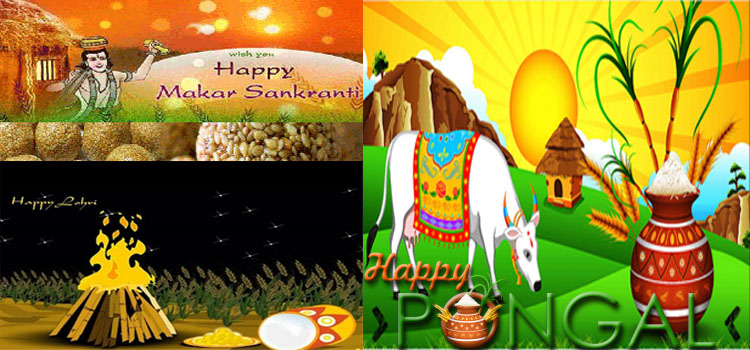
- This event has passed.
Pongal / Sankranti / Lohri
January 13, 2022 - January 18, 2022

This refers to a specific solar day in the Hindu calendar and a Hindu festival in for Lord Surya that is observed in January every year. It is known as Thai Pongal, Uzhavar Thirunal in Tamil Nadu. Uttarayan in Gujarat. Maghi in Haryana,Himachal Pradesh and Punjab. Magh Bihu or Bhogali Bihu in Assam.
Though popular belief has it that Lohri is celebrated to mark the end of peak winter, this festival is traditionally associated with the harvest of rabi crops. … And thus,Punjabi farmers see the day after Lohri (Maghi) as the financial New Year. The night before Maghi (Makar Sankranti), typically 13 January. is related to Pongal and is a popular winter time Punjabi folk festival, celebrated primarily by Sikhs and Hindus from the Punjab region of Indian subcontinent.
The Bhogi is the first day of Pongal and is celebrated in honor of Lord Indra, “the God of Clouds and Rains”. Lord Indra is worshiped to have abundance of harvest and bring plenty and prosperity to the land. Thus, this day is also known as Indran. On the day of Bhogi people clean their homes from top to bottom, and collect all unwanted goods. This day is meant for domestic activities and of being together with the family members.
All the houses will be thoroughly scrubbed and whitewashed. Homes are cleaned and decorated with “Kolam” – floor designs drawn in the white paste of newly harvested rice with outlines of red mud.
Pongal(Thai pongal/Surya pongal/ Sanskrati ) is a harvest festival of South India .It is one of the most important and popular Hindu festivals.  This four-day long harvest festival, Pongal is all about thanks giving to nature and takes its name from the Tamil word Pongal means “boiling over” and is held in the month of Thai (January-February). ‘Pongal’ literally means overflowing and is named so because of the tradition of cooking the new rice in pots until they overflow, which is a symbol of abundance and prosperity.
This four-day long harvest festival, Pongal is all about thanks giving to nature and takes its name from the Tamil word Pongal means “boiling over” and is held in the month of Thai (January-February). ‘Pongal’ literally means overflowing and is named so because of the tradition of cooking the new rice in pots until they overflow, which is a symbol of abundance and prosperity.
This festival marks a period of plenty, peace and happiness.. It is also called Surya Pongal because people worship Surya, the Sun God and his consorts.
This day, a special ritual is performed where rice and milk are boiled together in an earthen pot – to which a turmeric plant is tied – out in the open as an offering to the sun god. Along with this, sticks of sugarcane, coconuts and bananas are offered.
The third day of Pongal is dedicated to all cattle and is called Mattu Pongal or Kanuma. People offer prayers to the bulls, cows and other farm animals. Cows and bulls have always held a special place in India. Cows give nourishing milk while bulls and oxen help plough the fields. Thus, Maatu Pongal is a day when cattle are given a well deserved day of rest and are given pride of place. Therefore the farmers honor their cattle friends by celebrating it as a day of thanks-giving to them.
The cattle are washed well, their horns are painted and covered with shining metal caps. Multi-colored beads, tinkling bells, sheaves of corn and flower garlands are tied around their necks. They are fed with Pongal and taken to the village centers. Devotees pay their respect to cows by bending down, like praying in temple, and touching their feet and foreheads, followed by an aarthi (showing fire to the object of praise) and offering the cattle prasadam.
